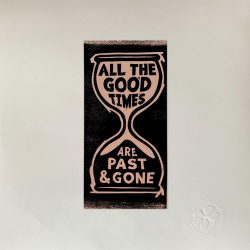Not the most sparkling selection of songs but well made by an established pair.
 This collection contains songs by Bob Dylan, John Prine, Elizabeth Cotten and Norman Blake, as well as new arrangements of traditional songs. It is the first Welch/Rawlings collaboration to feature both names on the cover and received a 2021 Grammy nomination for Best Folk Album. Just to be clear, ‘All The Good Times’, was originally released in July 2020 and was apparently a swift seller and whilst a limited edition, clearly popular. This reissue will have revised art and packaging when it is released in March.
This collection contains songs by Bob Dylan, John Prine, Elizabeth Cotten and Norman Blake, as well as new arrangements of traditional songs. It is the first Welch/Rawlings collaboration to feature both names on the cover and received a 2021 Grammy nomination for Best Folk Album. Just to be clear, ‘All The Good Times’, was originally released in July 2020 and was apparently a swift seller and whilst a limited edition, clearly popular. This reissue will have revised art and packaging when it is released in March.
Proceedings begin with Elizabeth Cotten’s, ‘Oh Babe It Ain’t No Lie’. It’s a lyrically straightforward opener that drops the listener right in at the heart of the Welch / Rawlings sound, minimal and slow of tempo. Cotten describes the song as,
‘About a lady who lived next door to us. She told my mother something: made my mother punish me. They hurt me all the day. ‘Cause I know what she told my mum was not true’.
Dylan’s, ‘Señor’, is far and away the least inspiring track on the album and does little more than replicate the writers own dirge-like version. Rawlings’ undoubtedly distinctive voice offers a vocal that does the song no favours. Although the pair can play this kind of slow-tempo track and make it interesting and engaging, it is not the case here. If like some, you find value in the lyric, then there are superior offerings out there, the Jerry Garcia Band for one. If you really want some fun go on-line to check out some of the nonsensical inflated interpretations of the lyrics.
As if to highlight the limitations of the previous track then the traditional, ‘Fly Around My Pretty Little Miss’ exhibits exactly where the duo excel. It’s a traditional bluegrass love song with no pretensions but a sweet charm enhanced by Welch’s clear, well enunciated voice and some delightful guitar accompaniment that repays close listening.
Prine’s, ‘Hello In There’, combines the qualities of the previous track (though Welch does occasionally strain for the high notes) with a simple yet moving lyric about time past, old age and loneliness which lends itself well to the sparse nature of the duo’s version. It’s the kind of track that invites a moment of quiet reflection once finished and it’s the album highlight.
‘Poor Ellen Smith’, is a traditional murder ballad taken at a suitably funereal pace. It’s familiar ground for this pair, that might prompt you to check out this AUK article from December 2020; https://americana-uk.com/book-review-santi-elijah-holley-murder-ballads-bloomsbury-academic-2020. ‘All The Good Times Are Past And Gone’, is another traditional song of lost love. ‘Ginseng Sullivan’, features a splendid Welch lead vocal (which she seems to be able to roll out at will using her so distinctive voice) about the hard times of a displaced man in search of this valuable root. It also features a particularly enjoyable guitar break.
‘Abandoned Love’, is the second Dylan track and generally thought to be inspired by his first wife Sara. His love songs are better written and more engaging than his more arcane and wilder musings, though this is not one of his best. It features a Rawlings lead vocal and will undoubtedly be familiar to many readers.
‘Jackson’, is the one song that bucks the trend here and it’s a pleasant surprise to see it featured. Unfortunately, nimble as it is, the swagger that made the Sinatra / Hazlewood version so compelling is absent and while Welch is the queen of Murder Balladry, this is less comfortable ground. The story of disaffected partners and their reciprocal threats to cut loose in Jackson always raises a smile but Sinatra (with her great sarcastic laugh) and Hazlewood nail the heart of this song – a tongue in cheek tale of sexual baiting.
The album finishes with, ‘Y’all Come,’ by Arlie Duff and rounds things off with a brief and jaunty request that we all pop by in the near future. Who could resist?
The best of this album is the Welch vocals and the harmonies with Rawlings, something that seems to work better than his solo singing. The playing is as always high standard, apposite and tasteful – something for which Rawlings has become a byword. However, as the Guardian review accurately put it, ‘When Welch leads, the album breathes‘.
Bar one track, this is a fine release which has a sound that will be familiar to fans of this talented pairing. Whether it contains anything notably new or ear-catching is less clear. There are no objections to cover versions and some of these are definitely worth the price of admission. There may be those who have what they consider sufficient material by Welch and Rawlings and this would, essentially, be more of the same. The topic of when enough is enough has been the subject of recent debate at AUK headquarters and every artist has their ‘must haves’ and ‘also rans’. On that basis, although it has clear qualities and is overall a good listen, it is not what one would call essential.


